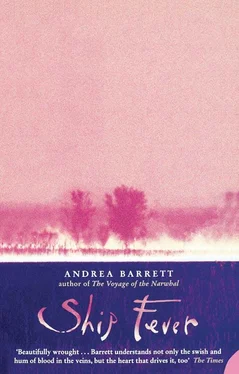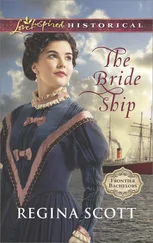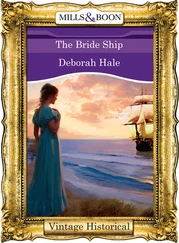“My father,” Mrs. Pearce says. “A most cultured and intelligent man, who believed girls should learn as well as their brothers. And you?”
“Partly my father, partly my brother, before…Partly by stealth.”
“Well, stealth ,” Mrs. Pearce says with a little smile. “Of course.”
In their excitement they’ve been walking so fast that they’ve left Juliet behind. They hear the men calling them and stop. Quickly, knowing she has little time, Sarah Anne asks the remaining important question. “And your husband?” she says. “He shares your interests?”
“He’s dead,” Mrs. Pearce says calmly. “I’m a widow.”
She lives in London, Sarah Anne learns, alone but for three servants. Both her daughters are married and gone. “I would be so pleased if you would visit us,” Sarah Anne says. “We have a place just a few miles from town, but far enough away to have all the pleasures of the country. In the gardens there are some interesting plants from North America, and we’ve quite a large library…”
Mrs. Pearce lays her gloved hand on Sarah Anne’s arm. “I’d be delighted,” she says. “And you must visit me in town. It’s so rare to find a friend.”
The others join them, looking cold and displeased. “Miss Colden,” Mrs. Pearce says.
“Mrs. Pearce. I do hope you two have had a nice talk.”
“Lovely,” Mrs. Pearce says.
She looks over Juliet’s head at Sarah Anne. “I’ll see you soon.” Then she hooks her hand into Mr. Hill’s arm and walks away.
“Odd woman,” John says. “Bit of a bluestocking, isn’t she?”
“She dresses terribly,” Juliet says, with considerable satisfaction. From the sharp look she gives Sarah Anne, Sarah Anne knows she’ll pay for that brief bit of reviving conversation. But her mind is humming with the pleasure of her new friend, with plans for all they might do together, with the letter she’ll write to Linnaeus the very instant she reaches home. She imagines reading that letter out loud to Mrs. Pearce, showing Mrs. Pearce the response she will surely receive.
“We should write him about that old potion,” Mrs. Pearce says; and Sarah Anne says, “What?”
“For melancholy. Don’t you know it?”
“I don’t think so.”
“It’s a potion made partly from the blood of swallows. Birds of summer, symbols of ease — the potion is supposed to ease sadness and give wings to the feet.”
“More likely than what he’s proposing,” Sarah Anne says, and Mrs. Pearce agrees.
It’s September now — not the September following their meeting but the one after that: 1764. The two women are in an unused stable at Burdem Place, patiently waiting, surrounded by their equipment. It is just barely dawn. Down in the reeds, where the birds are sleeping, they’ve sent Robert the gardener’s boy with a net and instructions. What they’re talking about while they wait is the letter Sarah Anne received last week from Carl Linnaeus, in which he graciously but firmly (and in Latin; but Sarah Anne can read it), dismissed her theories and stated his absolute conviction that swallows hibernate under the water. The letter upset Sarah Anne, but she would not have done anything more than fume had Mrs. Pearce not been visiting. It was Mrs. Pearce — Catherine — who’d said, “Well. We’ll just have to do the experiments ourselves.”
On the wooden floor they’ve set the bottom half of a cask, which Robert has filled with water. Below the water lies a few inches of river sand; on the surface a board floats an inch from the rim. A large piece of sturdy netting awaits the use to which they’ll put it. Inside the stable it’s still quite dark; through the open door the trees are barely visible through the mist. Above them the house sleeps. Just after four o’clock, Sarah Anne rose in her new room and tapped once on the door of the room down the hall, where Catherine stays when she visits. Catherine opened the door instantly, already dressed.
Recently it has been easier for them to talk about the swallows than about the other goings-on at Burdem Place. Juliet’s pregnancy has made her ill-humoured, and Christopher has changed as well. Sarah Anne knows she should have expected this, but still it has come as a shock. These days the guests tend to be Juliet’s frivolous friends and not the older naturalists. Young, not old; some of them younger than Sarah Anne herself. For weeks at a time they stroll the grounds in fancy clothes and play games while Sarah Anne hovers off to the side, miserable in their company.
Who is she, then? She doesn’t want to act, as Christopher does, the part of her parents’ generation; but now she’s found that she doesn’t like her own peers either. She fits nowhere. Nowhere, except with Catherine. She and Catherine, tucked into a wing away from the fashionable guests, have formed their own society of two. But she suspects that, after the birth of Juliet’s child, even this will be taken from her.
Christopher hopes for many children, an army of children. This child, and the ones that follow, will need a nurse and a governess, Juliet says. And a nursery, and a schoolroom. Sarah Anne has seen Christopher prowling the halls near her bedroom, assessing the space and almost visibly planning renovations. He’s welcomed Catherine’s frequent long visits — but only, Sarah Anne knows, because they keep her occupied and him from feeling guilty about her increasing isolation. The minute he feels pinched for space, he’ll suggest to Sarah Anne that Catherine curtail her visits. And then it’s possible he’ll ask Sarah Anne to be his children’s governess.
But Sarah Anne and Catherine don’t talk about this. Instead they look once more at Linnaeus’s letter, which arrived addressed to “Mr. S.A. Billopp” but which, fortunately, Christopher didn’t see. They arrange their instruments on the bench beside them and shiver with cold and excitement. They wait. Where is Robert?
It was Catherine who first approached this weedy twelve-year-old, after Sarah Anne told her she’d once overheard him talking about netting birds for food in Ireland. Catherine told him that they required two or three swallows and would pay him handsomely for them; Robert seemed to believe they had plans to eat them. Still, at 4:30 he met them here, silent and secret. Now he reappears in the doorway, barefoot and wet to the waist. His net is draped over one shoulder and in his hands he holds a sack, which pulses and moves of its own accord.
“Robert!” Catherine says. “You had good luck?”
Robert nods. Both his hands are tightly wrapped around the sack’s neck, and when Catherine reaches out for it he says, “You hold this tight, now. They’ll be wanting to fly.”
“You did a good job,” Catherine says. “Let me get your money. Sarah Anne, why don’t you take the sack?”
Sarah Anne slips both her hands below Robert’s hands and twists the folds of cloth together. “I have it,” she says. Robert releases the sack. Immediately she’s aware that the sack is alive. Something inside is moving, leaping, dancing. Struggling. The feeling is terrifying.
“Thank you, Robert,” Catherine says. Gently she guides him out the door. “You’ve been very helpful. If you remember to keep our secret, we’ll ask you for help again.”
By the time she turns back to Sarah Anne and takes the sack from her, Sarah Anne is almost hysterical.
“Nothing can satisfy but what confounds,” Catherine says. “Nothing but what astonishes is true.” Once more Sarah Anne is reminded of her friend’s remarkable memory. When Catherine is excited, bits of all she has ever read fly off her like water from a churning lump of butter.
“All right now,” Catherine says. “Hold the netting in both hands and pull it over the tub — that’s good. Now fasten down the sides, all except for this little section here. I’m going to hold the mouth of the sack to the open part of the netting, and when I say the word I’ll open the sack and you drop the last lip of the netting into place. Are you ready?”
Читать дальше
Конец ознакомительного отрывка
Купить книгу












